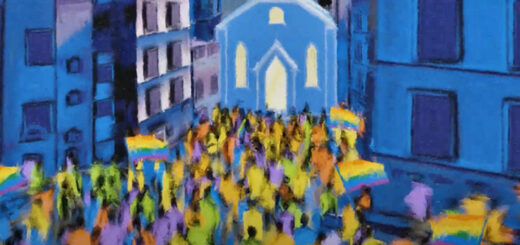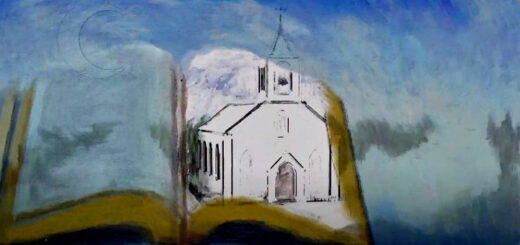LGBT Christian Groups European Forum: Do christian churches have the will and capacity to welcome young LGBTS?
Dea Santonico, Christian mother with a homosexual son of AGEDO, Public conference/panel on LGBT Youth at Aula Magna Facoltà di Teologia Valdese (Rome, 12 May 2018)
In this speech I will try to investigate the causes that, in my opinion, are behind the difficulties of the inclusion of LGBT people in the catholic church. I believe that the analysis of the problem is an essential prerequisite so that the care we identify is effective.
I have been questioning this problem since – more than ten years ago – Nuova Proposta has arrived in our community, the Basic Christian Community of St. Paul (a marginal reality within the catholic church, born at the beginning of the years 70 in the Basilica of St. Paul). In reality, in the community we had been confronted on this issue even before, thanks to Vincenzo, a gay boy, who arrived in the community around the 1990s. It is he who made us take the first steps on this territory, a bit ‘unknown to us, and took us to the gay pride of 2000.
Two years ago, the coming out of one of my two children changed things further. Before, in front of that exclusion in the church and in the society, I felt a strong solidarity towards LGBT people, now I feel that exclusion as mine. And it’s another thing. With my husband we share a journey with other parents in an experiential group, Word and Words, started in Rome this year, thanks to the collaboration of parents coming from three christian realities, Cammini di Speranza, CVX and the Basic Christian Community of S. Paul. Mixing our words with the Word of the Bible, we intertwine our experiences among parents and with a group of boys from Cammini di Speranza, who joined us.
Let’s come to the analysis of the problem that I propose to you. Why, despite the exceptions that are there and are important, the experiences of groups of homosexual believers and groups of parents are struggling to find space or are they viewed with suspicion in our church?
The problem of the catholic church is not, in my opinion, homosexuality, not only, it is sexuality in general. Almost everything is wrong: no to masturbation, no to sexual union between unmarried persons, no to any form of contraception, no to homosexual relationships. An incredibly detailed series of prohibitions that, as far as we know, do not come from Jesus at all nor from the evangelists who wrote the Gospels, but which is central to the catholic church. Why?
I try to give an answer. The dream of Jesus was to create a community of faith, which freely adhered to his proposal of love, with which to share the journey for the construction of the kingdom of God. The church yielded to the temptation to seek a sequela, relying on fear, No other instrument like fear is just as effective for controlling consciences and exercising power over them.
That’s why sexuality is so important. People do not normally kill anyone and do not steal. Sexuality affects everyone. Through sexuality we reach everyone and cover the entire life span of people, from boys, young people to old people. It is the means by which the church exercises its power to control consciences. And this is the true power of the church, the one for which the political powers fear it and seek its support, granting it in return privileges from which they expect returns in terms of electoral support. And the church thinks of finding a way to ensure a presence in the society. Important instruments of these exchanges of support-privileges are today the concordats between the church and the different national states. In Italy, on the 11th of February 1929, the Patti Lateranensi were signed, less than
two months later, on the 24th of March, on the occasion of the elections for the new fascist Chamber, Mussolini obtained the reward and had a plebiscite, also thanks to the vote of catholics.
The proposal of faith creates disciples, conscious and responsible followers, fear creates subjects, which ensure the maintenance of power.
Mine is not an anticlerical attitude, which I understand and which is fairly well founded for those who know history, but which does not belong to me. Instead, other moves me. The indignation to hear the name of God, use the name of Jesus to create suffering, and enormous suffering – I am thinking especially of women and homosexuals – forgetting that our task was to bring the good news of Jesus. My love for my church moves me, that I would like to see on a journey of conversion.
What to do? Continue what we are already doing. Come out more and more, you boys and girls and we parents, carry on proudly our experiences, our paths together in groups of parents and groups of LGBT boys and girls. With the awareness, however, that our requests for inclusion, apparently innocent and harmless, are going to touch a difficult knot to be dissolved in our church. Sexuality is only an instrument, the node to be dissolved is that of power. And we must acquire more and more awareness that change can only start from us, the ball is up to us, if we wait for others to play it, we will stand still. It’s difficult? Yes, it is. But on the other hand wasn’t Jesus who placed the marginalized at the center, as privileged recipients of the kingdom of God, and as protagonists of its construction?
In the parable of the Samaritan it is him, the Samaritan, who breaks down a barrier, with his gesture, and builds a piece of that kingdom of God that Jesus dreamed of. One of those Samaritans, who, in the time of Jesus, were the marginalized among the marginalized, the impure par excellence, from which to stay away so as not to be infected. It’s up to the Samaritan. The priest and the levite do not make it, not because they were bad, but because they had other important tasks waiting for them, other objectives, other plans to be implemented, other important rules to keep them bound. They go on, leaving the wounded on the ground, because they remain harnessed in their roles.
It’s up to us to start and make our contribution so that the barriers of any discrimination can be broken down. It is up to us to propose to our church a journey of conversion and to follow it all together.
* LGBT+ young people from over 25 European countries gathered in Albano Laziale (RM) to discuss their wishes and hopes regarding the ability of Christian churches to welcome them and enhance their contributions, at the Annual Conference of the European Forum of LGBT Christian Groups, organised in partnership with Cammini di Speranza and REFO (Evangelical Faith and Homosexuality Network). A public conference on Saturday 12 May, in the Aula Magna of the Waldensian Faculty of Theology in Rome, provided suggestions for understanding both the mood of young LGBT+ Christians and the possibility of a more open approach to pastoral care.
Original text: Le chiese cristiane hanno la volontà e la capacità di accogliere i giovani LGBT?






